What a difference a day makes - in a dog's life!
Friday, February 27, 2015
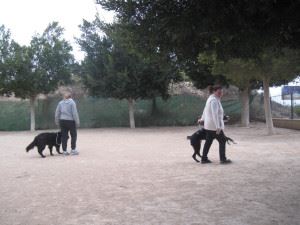 - Wednesday 18 February - Paddy is wound up, and won't walk to heel. I'm wound up too!
The first 6 words of the title are not only a great 1959 song from Dinah Washington, they are an appropriate description of how I felt after Paddy's training class on Tuesday. Now, if you've been paying attention to my regular ramblings, you're probably chiming in with 'Hang on - isn't Paddy's training class on Wednesday?'
Well, yes it has been, until now, but we haven't been making a great deal of progress. One week, everything seems to be going well, and the next, we seem to be back at Square One. Paddy is a very intelligent dog, and that's not just Mummy Bias on my part. His trainer Alex said so the first time I took him to training at Pets World on the San Miguel-Orihuela road (CV 95). He's also very stubborn, very persistent, and very protective of me. So when there's an aggressive or wound up dog around, Paddy's first thought is that there is a threat to my safety and stability, so although he's a real sweetie with people and other dogs normally, he's been a bit twitchy with the dogs at training. That makes me anxious, he picks up on it, and so we've been getting nowhere.
Alex saw how upset I was, and suggested that this week, I brought Paddy on Tuesday instead of Wednesday. I couldn't see that it would make any difference, but I trust Alex's judgement, and I didn't have any better ideas, so I decided to give it a go. As soon as I got there, I knew Tuesday was going to be different. I always park as far away from the training ring as I can, so I can walk Paddy calmly down to the other dogs, rather than parking the car in the midst of dogs and owners, and having him going ballistic because he scents playtime. Usually, at least one or two dogs start barking, and he responds and pulls, winding himself and the other dog/s up. This time, they're all sitting or standing serenely by their owners, so Paddy ambled along, tail wagging, not even trying to turn my 5' 2" inches from vertical to horizontal. Good start.
One of Alex's provisos for the change of day was that Paddy wore a muzzle until we were certain he would be fine
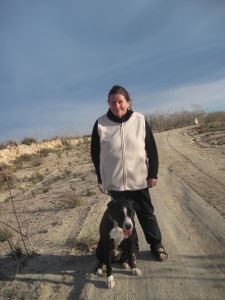 - Out of breath after running free with the other dogs on the campo - and coming back the first time he was called!
with the other dogs. I wasn't happy about that, but I understood why it was necessary. Dogs are pack animals, and they learn behaviour from the pack. My laid-back little man was learning to be a wired-up puppy on a string, so we had to proceed with caution. After about 10 minutes, Alex decided the muzzle wasn't necessary. Just as well really, as Paddy took less time to get it off than I took to get it on.
He happily joined in with every activity and training exercise, both on and off the lead. Regular readers of Paddy's exploits - and my resulting embarrassments - are going to find this hard to believe, but it's true. Three times I called Paddy back to have his lead back on, and three times he came at the first call. Not only that, but when we did the 4 stage walking exercise, we completed all four stages. It works like this: you walk the dog, then at Alex's signal, you stop and the dog stops with you. Next stage is to stop and get the dog to sit, then stop and get him to lie down, and finally stop, get the dog to lie down, then walk away while he stays.
I can almost hear the laughter from my so-called friends - Paddy stay? No chance! Where Mummy goes, so does he. And such was the case - until Tuesday. Okay, he only 'stayed' for three and a half steps, but he kept that backside welded to the floor for three and a half steps more than he'd ever done before, so I call that a result. If only I had the evidence captured on camera, but the battery chose that particular second to die. However, I have independent witnesses - both Alex and my friend Glenys were witness to the miracle.
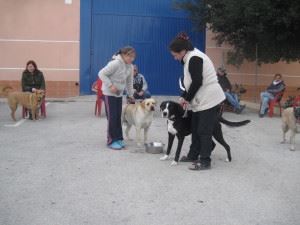 - Tuesday 24 February - calmly and happily sharing the water break with the other dogs - what a difference a day makes!
So, what made the big difference? A number of things, but mainly the fact that Paddy was with a group of dogs that he was comfortable with, so he relaxed and enjoyed the training, which allowed me to do the same. I'm not saying there's anything 'wrong' with the other dogs - just Paddy's perception of them. He's still only a youngster after all, so he needs to learn how the real world works, and that just because another dog is aggressive to Paddy, it doesn't mean he's going to rip my throat out, so Paddy doesn't need to act as my 24/7 minder.
Now Paddy can concentrate on enjoying being a dog, and learning how to behave acceptably in polite company. And finally, I'm confident that the hooligan in him can be banished - or at least, toned down considerably. What a difference a day makes!
Like what you've just read? Check out my blog at Sandra In Spain
 0
Like
Published at 11:18 AM Comments (4)
0
Like
Published at 11:18 AM Comments (4)
Am I parking or camping? Let the traffic cops explain the difference!
Friday, February 20, 2015
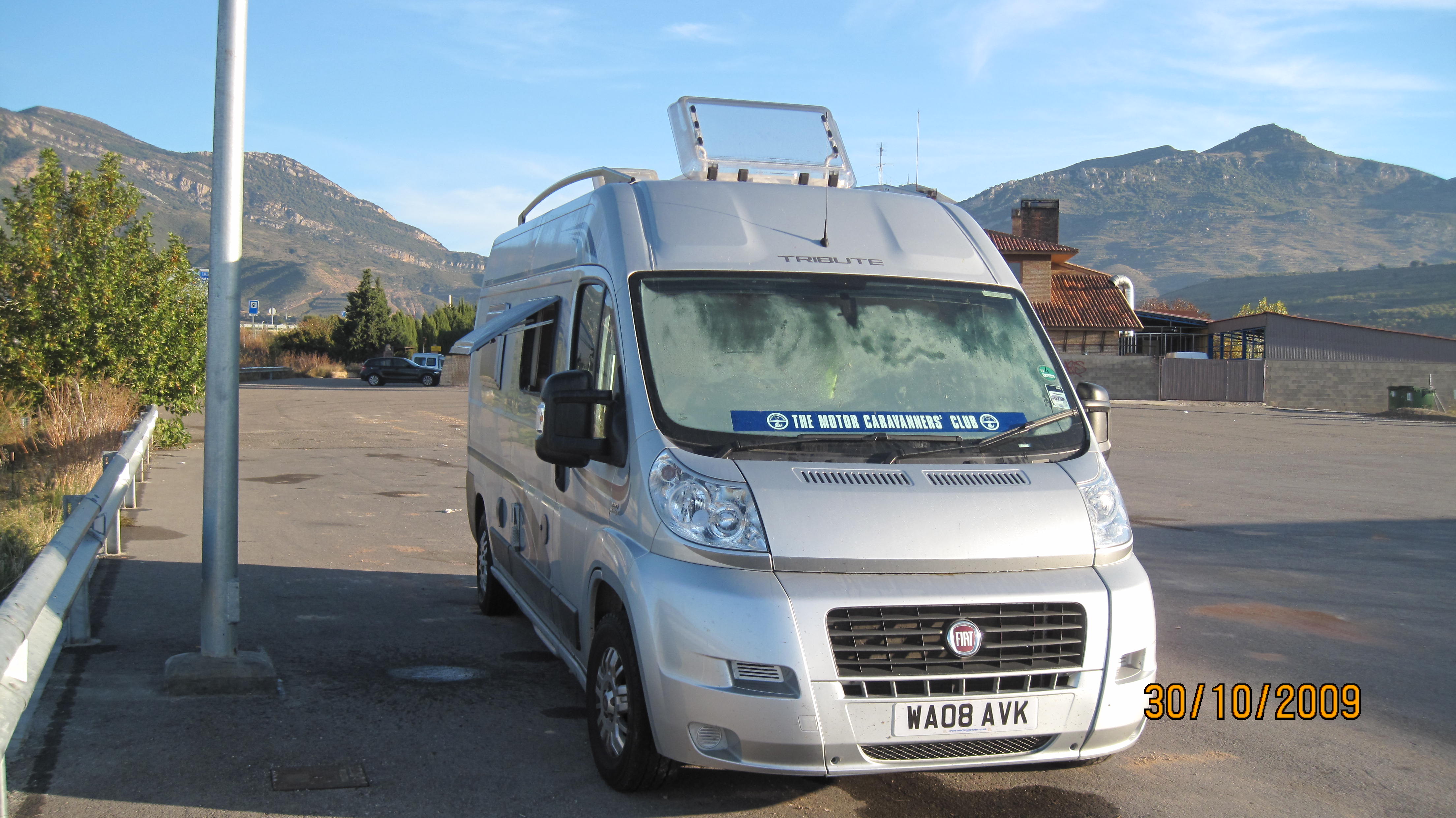 Europe is much more motor home friendly than the UK, and that means that sometimes motorcaravanners from all over the place extract the liquid waste by just pitching up anywhere for free. On the long drive through Spain and France, we've occasionally parked up for the night when we couldn't find a campsite or a safe truck stop, and we always wondered if we were unintentionally breaking the law. Europe is much more motor home friendly than the UK, and that means that sometimes motorcaravanners from all over the place extract the liquid waste by just pitching up anywhere for free. On the long drive through Spain and France, we've occasionally parked up for the night when we couldn't find a campsite or a safe truck stop, and we always wondered if we were unintentionally breaking the law.
However, this new Facebook page seems to explain it well, along with all other traffic-related matters. It's run by the Torrevieja Traffic Department, and they post articles and short posts about the traffic laws in Spain, as well as answering questions from followers.
It's illegal to discriminate against motor home drivers, and local authorities cannot ban motor homes from parking in an area where other vehicles are allowed to park. However, all vehicles must respect the parking guidelines, so if there is a parking area marked off along a residential street, you can park there, but you must keep the vehicle within the marked area. It's the same with parking spaces on a car park. Park within the lined spaces, even if you need to take up two bays.
When the motor home is parked and the engine is turned off, you can eat in it or sleep in it. However, if you put out the awning, or get the tables and chairs out, you are classed as camping, and that is illegal. So basically, all those people around Playa Flamenca and La Marina who have their generators out, the satellite dishes set up for TV and the tables and chairs tastefully arranged are breaking the law. And it's also illegal to dispose of your waste water just anywhere. The same rules apply in France, and in fact some Aires where you are permitted to park up overnight for free or for a small charge also stipulate that you mustn't set up awnings or camping furniture. This applies particularly to Aires in town centres.
The best plan would seem to be to use wild camping wisely - think parking not camping. If you want the tables and chairs out, take them down to the beach or into the countryside, or book into a campsite, but don't set up your tapas table right outside somebody's casa. That's just good manners anyway, isn't it?
Another option - which many motorcaravanners don't seem to know about - is to park up at a 'Venta.' That's an independent roadhouse, rather than one of the chains of eateries that are strung out over Spain's autopistas. You'll need to come of the motorway to find one, but if you go in and buy a meal, they'll be happy to allow you to park up overnight for free. In most ventas, a home cooked meal for two will cost less than a night on a campsite anyway, and you can really relax and enjoy your overnight stop.
Again - remember it's parking not camping, so don't get out your collapsible rotary drier and wash your smalls in the car park. It will only put people off their dinner, and the venta owner won't want that! When you're looking for an overnight stop with a motor home in Spain - which is a very motor home friendly country - just remember you need to be people friendly, and park up in a way that won't cause annoyance or disturbance to others. It's all about good manners, as I said before.
If you like what you're reading, check out my website, Sandra In Spain
 1
Like
Published at 9:45 AM Comments (5)
1
Like
Published at 9:45 AM Comments (5)
Buying property in Spain - there's never going to be a better time!
Wednesday, February 11, 2015
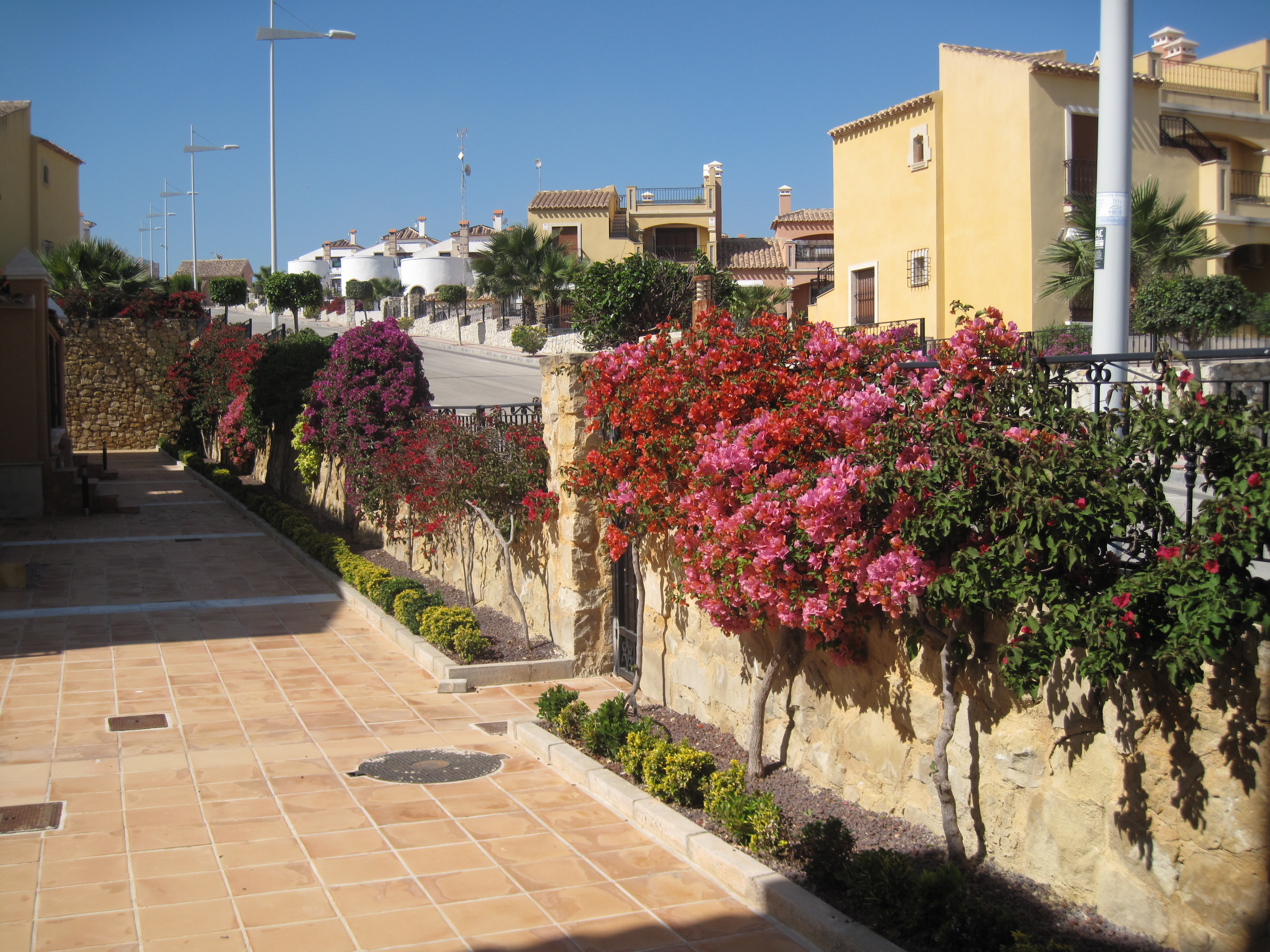 Okay, you've probably been hearing this for the last 5 years or more, as property prices in Spain went into freefall and the parachute persistently refused to open and ensure a safe landing. However, now that Sterling is strong against the Euro, this really is the best time to buy in Spain, because not only can you snag a bargain property which probably won't need any refurbishment at all, it will cost you less to maintain it, as your Euros will go much further. Okay, you've probably been hearing this for the last 5 years or more, as property prices in Spain went into freefall and the parachute persistently refused to open and ensure a safe landing. However, now that Sterling is strong against the Euro, this really is the best time to buy in Spain, because not only can you snag a bargain property which probably won't need any refurbishment at all, it will cost you less to maintain it, as your Euros will go much further.
I'm not a 'What If?' kind of girl. I take opportunities as they arise, and never look back in anger or regret, because it's a pointless exercise. We bought our property in early 2008, just before the economic slump, and at a time when property prices were unsustainably high. We paid €157,000 for our 2 bedroom garden apartment on La Finca, which, at the prevailing exchange rate of around €1.34 to the Pound Sterling worked out to around £116,700. We fell in love with the property at first sight, it was within our budget - just - and we had enough from the sale of our house in the UK to buy without a mortgage and leave us comfortably off, so that's exactly what we did.
Today, almost 7 years to the day since we signed on the dotted line, the exchange rate is pretty much identical at €1.345 to the Pound. The difference is, we could now buy the same property for around €100,000, or £74,300. That's over £40,000 less than we paid, but this isn't a whinge about how much we've 'lost' on our property - it's a clear illustration of the economic sense of buying in Spain at the moment.
Our 7 years of happiness in Spain are way beyond price, and that's why I've done the sums here to encourage others. What goes down also goes up, and vice versa, and while nothing is certain, it's likely you'll be much better off in the long run if you buy in Spain while property prices are still low and the Pound is strong against the Euro. And even if your home in Spain doesn't perform as expected and increase in value, you still have somewhere to go where you can enjoy your investment. You couldn't do that if your money was sitting safely in the building society.
Don't take my word for it though. Steve Hall of This Is Spain is highly experienced in this sort of stuff, and his latest article clearly illustrates that there are real bargains to be had. In Algorfa, which is a lovely village 10 miles inland from Torrevieja on the Costa Blanca, €30,000 - €50,000 (£22,300 - £37,200) will give you a wide choice of two bedroomed apartments, most with the use of a community pool. So, what are you waiting for? Now really is the best time to buy property in Spain!
Like what you've just read? Check out my website Sandra In Spain for more about life in Spain.
 1
Like
Published at 9:41 AM Comments (1)
1
Like
Published at 9:41 AM Comments (1)
Driven to distraction on the carretera!
Thursday, February 5, 2015
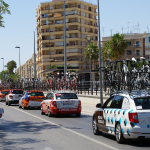 I only started to drive on the ‘wrong’ side of the road when we moved to Spain in 2008, and I have to say I much prefer driving in Spain to driving in England – particularly around Algorfa, where more than 4 cars at a junction constitutes a traffic jam! One thing I’ve never got to grips with though is the psyche of the Spanish driver. The moment he spots a foreign number plate, the Spanish motorist morphs into Fernando Alonso. He simply must overtake, even if it’s on a bend or there’s a solid white line in the road, which means no overtaking, the same as it does in the UK. I only started to drive on the ‘wrong’ side of the road when we moved to Spain in 2008, and I have to say I much prefer driving in Spain to driving in England – particularly around Algorfa, where more than 4 cars at a junction constitutes a traffic jam! One thing I’ve never got to grips with though is the psyche of the Spanish driver. The moment he spots a foreign number plate, the Spanish motorist morphs into Fernando Alonso. He simply must overtake, even if it’s on a bend or there’s a solid white line in the road, which means no overtaking, the same as it does in the UK.
There’s a simple explanation for this. Your average Spaniard is never in a hurry – unless he’s behind the wheel. Then, he just has to get there first. It’s nothing personal against the Brits, he’ll overtake anyone who isn’t going fast enough for him, which means just about everybody else on the road. That’s why when you’re already on a roundabout, a Spanish driver will leap out in front of you, because he knows he can get there first. Or he’ll overtake you on the roundabout, because you’ve sensibly slowed down to negotiate it, and he can see no good reason for that.
Speaking of roundabouts, what really annoys me is the way the Spanish signal their intentions. They don’t, and you have to play Mystic Meg and guess where they’re heading. Again, a little basic knowledge of the Spanish character helps here. The average Spaniard is so full of his own importance behind the wheel he expects everyone to know what he’s doing and where he’s going. If you don’t guess right, it’s your fault, not his. He’s in a juggernaut, therefore it’s obvious he’s taking the motorway for Alicante. Why should he cut short his mobile call or stub out his cigarette just to let the other road users know?
If you’re a pedestrian, take care when crossing the road, even on a pedestrian crossing. Make that especially on a pedestrian crossing. The Spanish view crossings as a challenge, not as a road safety measure, and the only time they’re likely to stop for you is if there is a policeman in attendance, such as at school turning out times
There are red and white crossings on very busy roads in Spain, at which drivers are obliged to stop for pedestrians. Don’t bank on it, though, because nobody seems to have informed the Spanish motorists of their obligations, so they’ll sail across the red crossings happily. That’s if they haven’t parked across them to pop in for a lottery ticket or a barra de pan.
The best way to get across the road safely is to try to cross where it’s patently dangerous to do so. The Spanish drivers will admire your spirit and disregard for the rules and will stop to let you across. I know, because it’s happened to me more than once. A good place to try this is the Punta Prima roundabout, by the Punta Marina shopping centre. Save your legs – don’t walk up to the blue pedestrian bridge – just walk out in front of one of the cars. Everybody does. However, I don’t recommend you try this with young children in tow or while in possession of a zimmer frame.
So, has this put me off driving in Spain? Not a bit of it. If anything, the whimsical attitude of Spanish drivers has made me a better driver, because I’m extra vigilant these days. I’m also a ‘glass half full’ girl, so after a particularly frustrating experience on the carretera, I console myself with the happy knowledge that at least the Spanish aren’t so fond of hooting their horns as the Italians.
Photo credit: Maggs224.com
Like what you read? Check out my website, Sandra in Spain
 0
Like
Published at 9:30 AM Comments (6)
0
Like
Published at 9:30 AM Comments (6)
Spam post or Abuse? Please let us know
|
|